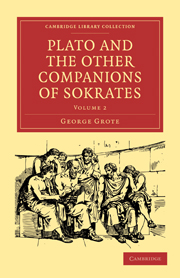CHAPTER XXIV - PHÆDRUS—SYMPOSION
Published online by Cambridge University Press: 05 October 2010
Summary
These two are the two erotic dialogues of Plato. Phædrus is the originator of both
I put together these two dialogues, as distinguished by a marked peculiarity. They are the two erotic dialogues of Plato. They have one great and interesting subject common to both: though in the Phædrus, this subject is blended with, and made contributory to, another. They agree also in the circumstance, that Phsædrus is, in both, the person who originates the conversation. But they differ materially in the manner of handling, in the comparisons and illustrations, and in the apparent purpose.
Eros as conceived by Plato. Different sentiment prevalent in Hellenic antiquity and in modern times. Position of women in Greece
The subject common to both is, Love or Eros in its largest sense, and with its manifold varieties. Under the totally different vein of sentiment which prevails in modern times, and which recognises passionate love prevailing only between persons of different sex—it is difficult for us to enter into Plato's eloquent exposition of the feeling as he conceives it. In the Hellenic point of view, upon which Plato builds, the attachment of man to woman was regarded as a natural impulse, and as a domestic, social, sentiment; yet as belonging to a common-place rather than to an exalted mind, and seldom or never rising to that pitch of enthusiasm which overpowers all other emotions, absorbs the whole man, and aims either at the joint performance of great exploits or the joint prosecution of intellectual improvement by continued colloquy.
- Type
- Chapter
- Information
- Plato and the Other Companions of Sokrates , pp. 206 - 262Publisher: Cambridge University PressPrint publication year: 2010First published in: 1865

